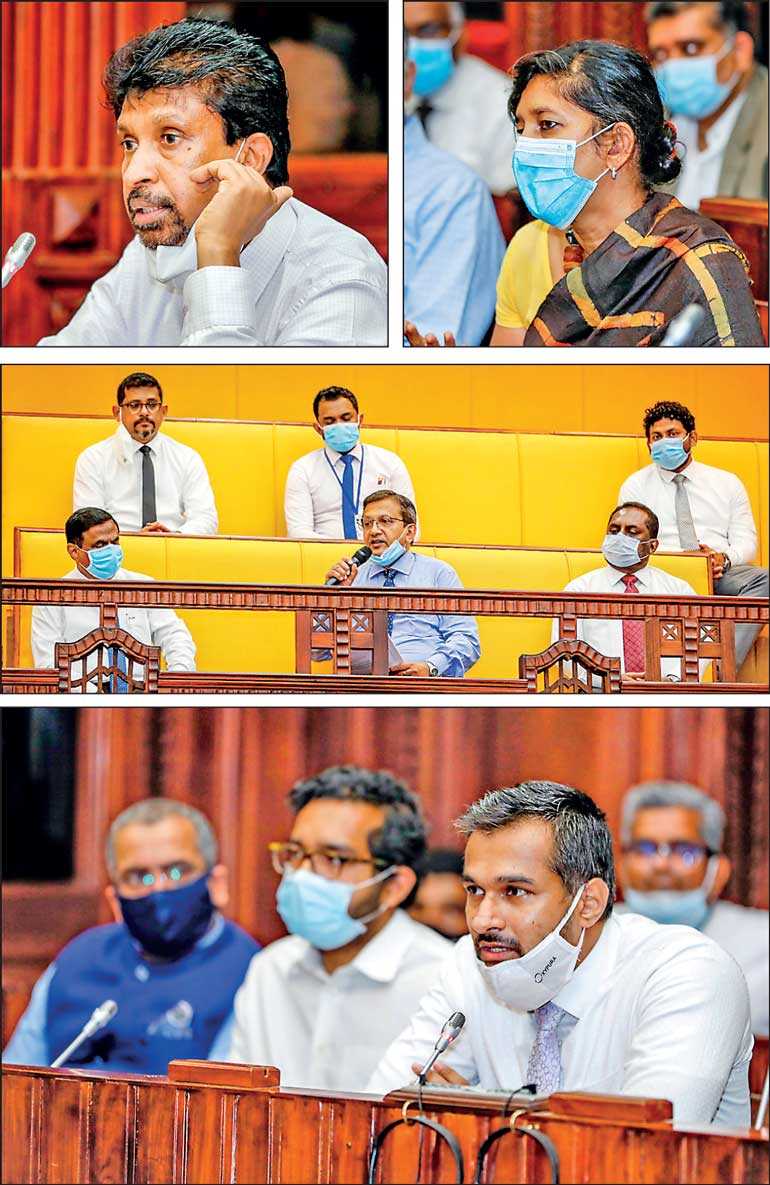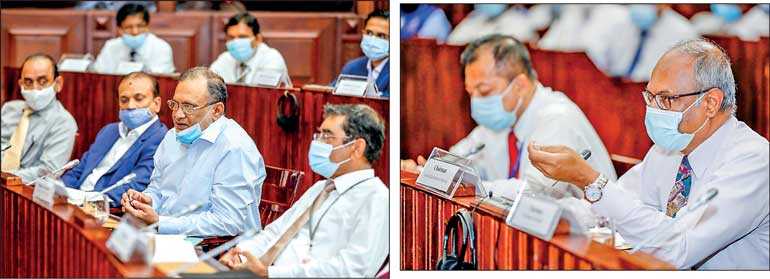Saturday Feb 21, 2026
Saturday Feb 21, 2026
Tuesday, 16 June 2020 00:00 - - {{hitsCtrl.values.hits}}
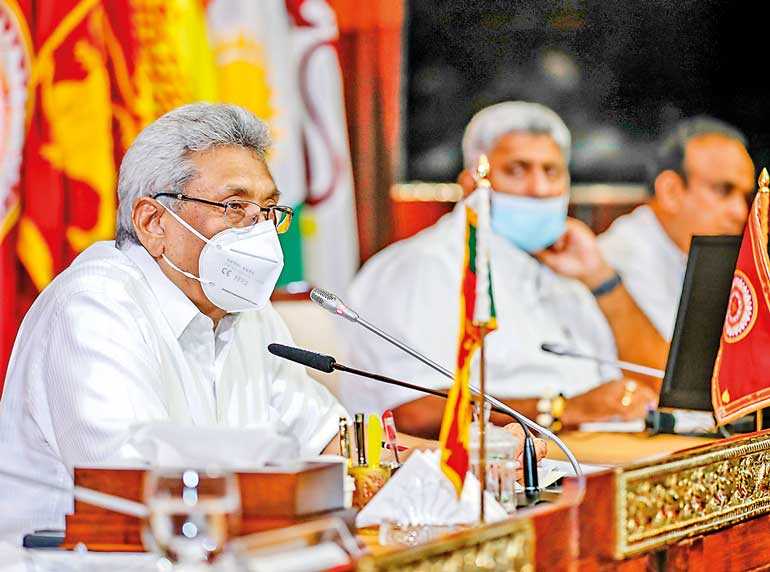
President Gotabaya Rajapaksa
By Charumini de Silva
President Gotabaya Rajapaksa is to chair the Exporters’ Forum quarterly to resolve their issues following an initial engagement last week.
The move follows on the heels of a specific request by the exporters on the need for a presidential hearing and intervention. The Export Development Board (EDB) has an ongoing monthly forum where various issues are resolved. 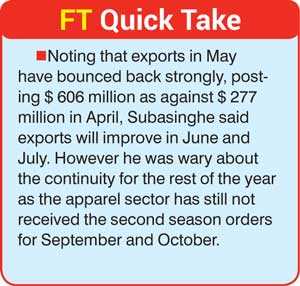
Following various concerns expressed at the initial meeting that President Gotabaya Rajapaksa had with the export community last week, the Presidential Task Force on Economic Revival and Poverty Eradication Chairman Basil Rajapaksa and the EDB have been tasked to follow up and address the issues faced by the exporters.
“The meeting last week with the President largely revolved around building alternate markets, increasing value-added exports and diversifying the export basket,” EDB Chairman Prabhash Subasinghe told the Daily FT.
Noting that exports in May have bounced back strongly, posting $ 606 million as against $ 277 million in April, Subasinghe said exports will improve in June and July. However he was wary about the continuity for the rest of the year as the apparel sector has still not received the second season orders for September and October.
Concerns of the exporters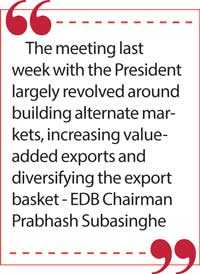
Among the many existing concerns that were raised by exporters was that they need multiple export credit insurance companies, noting a single entity SLECIC was not sufficient in providing innovative trade-related credit insurance solutions and guaranteeing support services for the development of exports.
In addition, the agri exporters pointed out that lack of a line ministry for fruits and vegetables has led to many difficulties in developing the sector.
Tea exporters have requested the Government to allow importation of packaging material and herbs to add value. They also insisted that if the value-added component is high, to reward such exporters with incentives. Seafood and agriculture exporters also highlighted that the post-harvest losses, high air freight costs, and lack of sufficient cargo facilities have impacted negatively. They have also proposed for crop insurance for farmers.
Coconut exporters has suggested monocropping, an agricultural practice of growing a single crop year after year on the same land, in the absence of rotation through other crops or growing multiple crops on the same land (poly-culture). 
The rubber exporters have called on the need to implement the Rubber Master Plan outlined in 2017 to drive the industry to the next level. The spice and allied product sector has called on the Government to allow importation of organic ethanol as a raw material to add value.
The export community has requested to avoid ad hoc policies, noting that the new Gazette notification was complicated.
In terms of the apparel industry, the exporters suggested creating a strategic plan to monitor the investments in the sector.
The ICT/BMP sector has pointed out that there are new opportunities and to appoint a new committee to assist SMEs.
Electronic components exporters underscored the importance of Research and Development (R&D) to develop the sector, and requested to allow imports of particular equipment and support for the university to expand the electronic exports.
President Rajapaksa assures support
Addressing the meeting, President Gotabaya Rajapaksa said the Government is ready to give its fullest support to the export sector to realise its full potential through correctly identifying and rectifying prevailing grievances and obstacles faced by it.
However, he stressed the challenge before exporters is to show results by expanding the export sector, which is at present limited to a small range of items, to greater heights aiming the international market. The COVID-19 pandemic has caused an adverse impact on every sector of the economy. With the gradual resumption of day-to-day activities, followed by the successful mitigation of the virus, the economy is re-bounding beyond expectations, President Rajapaksa pointed out.

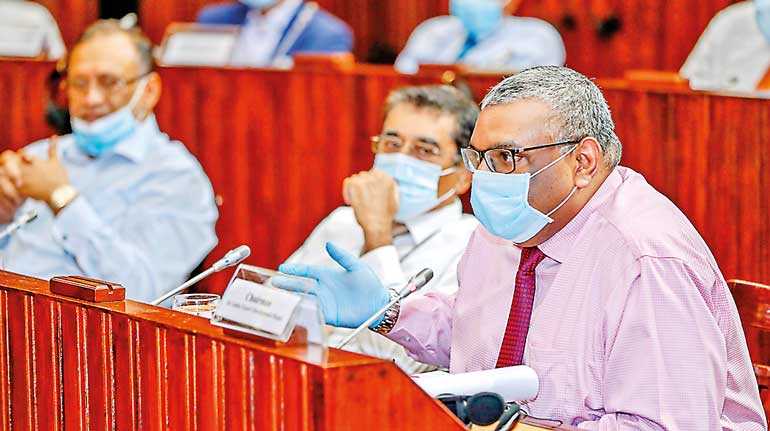
“We have very few export businesses which surpass $ 1 billion in foreign exchange income. Opportunities are available to expand this,” President Rajapaksa said according to President’s Media.
Higher incomes can be earned through adding values to agro products such as cinnamon, cloves and nutmeg. A new market is now emerging in the global economy with the spread of COVID-19. A large market has emerged in the Asian region centred on the Middle East, China and India. President Rajapaksa said that he firmly believes Sri Lankan exporters with their broad knowledge in management and marketing will be able to conquer this new market.
Using this potential, the exporters will also have the responsibility of strengthening the economy rapidly with a new vigour, emphasised the President.
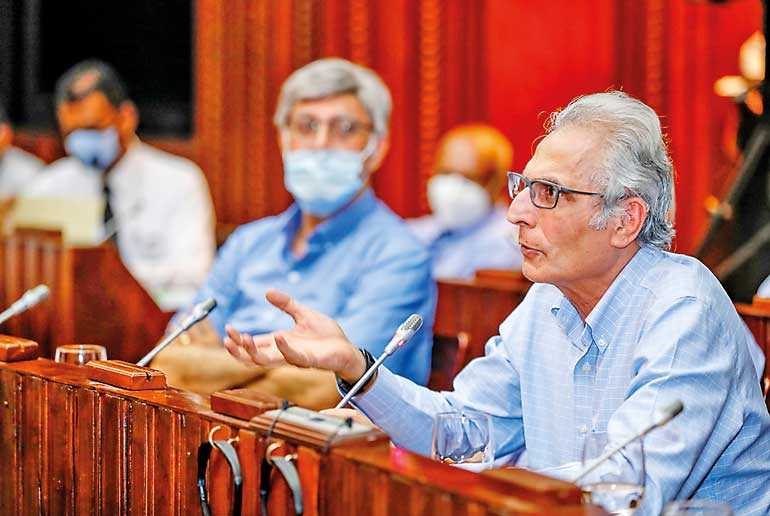
Rajapaksa said that the Government was able to control and prevent unhealthy developments in the foreign exchange market by introducing prudent measures to halt importation of agricultural products that can be grown domestically and halting the importation of non-essential products as well as to protect the farmers.
According to President’s Media the entrepreneurs at the meeting had pointed out the issues related to the non-availability of fertiliser for certain export crops and the shortage of animal food for animal husbandry. The President said that steps have already been taken to solve these issues. The exporters said that the support given by the institutions directly related to the export process like Port, Airport, BOI, and Customs is praiseworthy. The representatives also commended the role played by the Head of the Presidential Task Force Basil Rajapaksa in this regard.
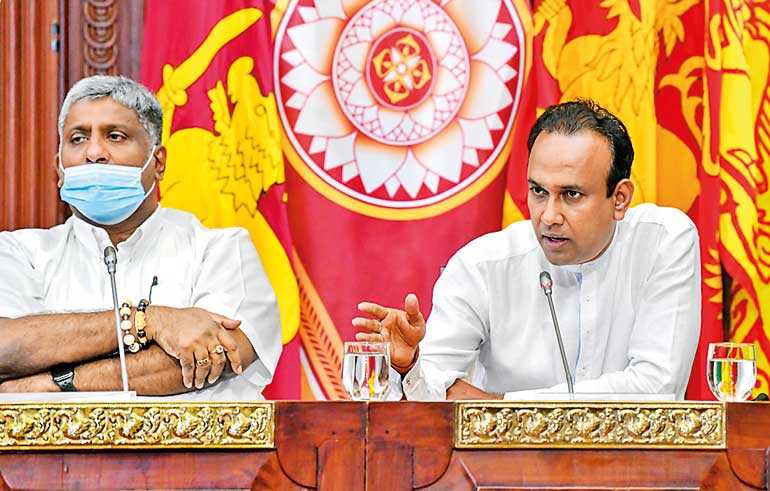
Issues revolving the exportation of coconuts, coconut oil, coconut-based products, tea, apparels, vegetables, fruits, rubber and rubber based products, Information Technology, seafood, minor crops including black pepper were discussed in depth. Export diversification was recognised as essential during the discussion.
Several raw materials have to be imported for re-exportation purposes. However, this should be done without causing adverse effects to the local farmers, Basil Rajapaksa stated.
The Government expects households to meet their coconut consumption requirement from their own home gardens. In the global market there is a very high demand for coconut based exports. As such, the government has devised plans to protect coconut plantations and uplift the Coconut industry in the Northern Province along with other provinces. The exporters stated that the use of advanced technological methods to gather data of the agro harvests across the country will allow them to purchase these harvests without difficulty.
Exporters were confident that if the right technical equipment and devices are imported they will be able to produce low-cost laptops, computers, mobile phones and telephones locally. President Rajapaksa agreed to assist them in this endeavour.
Ministers Dr. Ramesh Pathirana,Prasanna Ranatunga, Chairman of the Presidential Task Force Basil Rajapaksa, Secretary to the President, Dr. P.B. Jayasundera, business leaders in the export sector and several heads of institutes related to imports and exports were present at the discussion.
